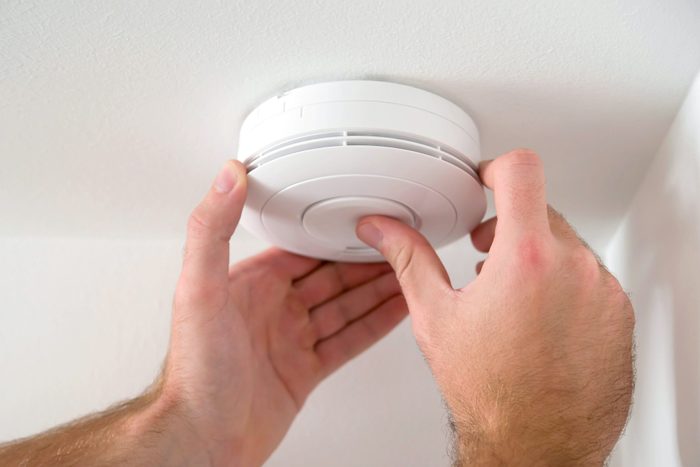How Often To Replace Smoke Detectors
Updated: Sep. 21, 2023

Smoke detectors are essential to home safety. But how long do they last, and when should you replace them?
We all know smoke detectors save lives, so it’s important to keep these essential devices functioning correctly. According to a 2021 report from the National Fire Prevention Association (NFPA), more than half of all residential fire-related deaths involved homes where smoke alarms didn’t work or weren’t installed.
Luckily, smoke detector maintenance is simple. Change the batteries every six months, keep them free of obstructions and replace the unit every 10 years. With older units, many people don’t know how often to do it, or why it’s so important.
Note: Technically, a “smoke detector” triggers a “smoke alarm,” which sounds a warning tone. Almost all residential smoke detectors are also smoke alarms. For our purposes here, we’ll call them smoke detectors.
On This Page
Why Is It Important to Replace Smoke Detectors?
Like everything else, smoke detectors wear out. Accumulated dust and grime make them less sensitive to smoke particles. As a result, the alarm may fail to sound when it matters most.
Older smoke detectors emit high-pitched, warning chirps when something’s wrong with the unit — usually a low battery. Some chirp when it’s time to replace it. Unfortunately, many people disconnect the smoke detector to silence it, then forget about it. Replacing your smoke detectors when you should keeps you and your family safe.
How Often to Replace Smoke Detectors
All smoke detectors should be replaced 10 years after their manufacture date. Whether it’s battery operated or hard-wired doesn’t matter. Neither does the brand. Combination smoke and carbon monoxide (CO) detectors should be replaced every five to 10 years, depending when the CO detector expires.
The reason for this universal is simple. Over time, the detector becomes less sensitive. After 10 years, it may not function properly.
Psst! This guide on how to replace hard-wired smoke detectors might come in handy.
Signs Your Smoke Detectors Need to Be Replaced
Some smoke detectors chirp after 10 years of service, indicating it’s time to replace it. Others don’t. Look for the manufacture date on the back of the unit to check its age. If you can’t find it, play it safe and install a new one.
But age isn’t the only reason to replace smoke detectors. Here are a few other signs that it’s time to upgrade.
Dirty detectors
Over time, any smoke detector will collect dust and dirt on its surfaces. Detectors in a kitchen or workshop are particularly prone to this.
Pro tip: Consider a photoelectric alarm for the kitchen. They’re less susceptible to false alarms from burning food. Frequent false alarms wear out the unit, requiring more frequent replacement.
Painted detectors
Despite being clearly labeled Do Not Paint, it’s common to see smoke detectors painted over. Paint impedes smoke particles from reaching the sensor, rendering the detector almost useless. Painted-over smoke detectors should be replaced as soon as possible.
Insect activity
Insect husks or spider webs can interfere with the detector’s sensitivity. If you notice this early, simply clean out the alarm. But be sure to test the unit regularly, and if in doubt, replace it.
Failed tests
All smoke alarms have a Test button for the sensors and the alarm. Test it once a month. If it fails to sound, replace it.
Persistent chirping
Persistent short chirps mean something is wrong, often a low battery. If the chirps continue after you’ve installed a new battery, replace the unit. Some smoke detectors ship with a 10-year battery that can’t be replaced. When they hit the 10-year mark, they give a warning chirp — your cue to replace it. Planning to buy a new one? Here’s what you need to know about different types of smoke detectors.
Cleaning an Alarm
Extend your detector’s lifespan by cleaning off cobwebs or accumulated dirt. It’s smart to do this when performing monthly checks or biannual battery changes. Check with the manufacturer of your specific model, but alarm manufacturer First Alert suggests these cleaning tips:
- Gently vacuum the outside with the soft brush attachment.
- Blow debris away with a can of clean compressed air, sold at office supply stores.
- Don’t use water, cleaners, solvents or air compressor machines.